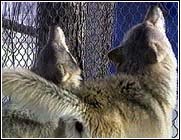 |
 |
|

Writer's Box|LinksURLs|Fractals|3Bs|Note|Freedom|Search|CatInHat
 |
Editor's Note
past issue
I wanted to bring this to your attention.
Bald eagle, gray wolf coming off Endangered Species List
 |
|
| Bald eagle | |
Web posted May 1, 1998 by CNN
Reporter Natalie Pawelski at: 9:33 p.m. EDT (0133 GMT)ATLANTA (CNN) -- CNN has learned that the peregrine falcon, the bald eagle and the gray wolf are among two dozen animals and plants that will be removed from the Endangered Species List.
The move is intended to signal a U.S. policy change that puts an emphasis on "de-listing" a species as soon as it recovers enough to survive.
Over the years, listing some species, such as the spotted owl, has provoked enormous and sometimes rancorous debate. It also has led to the shutting down of logging operations and the canceling of development in order to preserve habitat critical to the survival of certain species.
 |
|
| Gray wolf | |
Critics of the policy say no plant or animal has ever recovered because of the Endangered Species Act, but the new policy is designed to prove just the opposite.
Interior Secretary Bruce Babbitt plans to announce the "de-listings" next week near a Massachusetts bald eagle's nest.
The bald eagle was declared endangered in 1967 after the widespread use of the pesticide DDT weakened the eagles' eggs and incursions into their habitat threatened the species' existence.
Still protected by other laws
 |
|
| Peregrine falcon | |
The eggs of the peregrine falcon were also imperiled by the pesticide, which was finally banned in the 1970s.
In June 1994, the U.S. Fish and Wildlife Service proposed that the bald eagle's status be downgraded from endangered to threatened in all but three of the contiguous 48 states.
The peregrine falcon also has made a steady comeback since DDT was banned, but taking it and the bald eagle off the Endangered Species List will not make it open season on them.
They are still protected by other laws which do not allow them to be hunted.